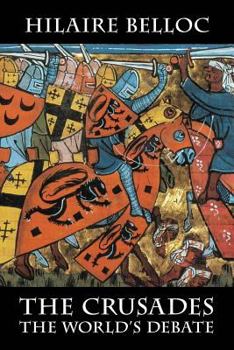The Crusades: The World's Debate
Select Format
Select Condition 
Book Overview
Hilaire Belloc (1870-1953)--one of the most prominent Catholic authors of his time--gives a common sense explanation of why the Crusades were necessary, and why they ultimately failed. He argues that the personal and strategic failings of the First Crusade's leaders led to the establishment of a state that could not be sustained, and that the absence of such a state left Europe vulnerable to Islamic aggression for centuries afterward. Writing in...
Format:Paperback
Language:English
ISBN:1948231085
ISBN13:9781948231084
Release Date:August 2018
Publisher:Cavalier Books
Length:228 Pages
Weight:0.70 lbs.
Dimensions:0.5" x 6.0" x 9.0"
Customer Reviews
4 ratings
Good and thorough
Published by Thriftbooks.com User , 20 years ago
This book is a very good and thorough examination of the Crusades and why Europe lost by explaining in an almost scene by scene replay of the event. Belloc was suportive of the Crusades and believed even back when he wrote this (at least 80 years ago) that the Muslims would retaliate once more and look who was right! Brilliant but at times it begins to drag.
Review from the Publisher
Published by Thriftbooks.com User , 23 years ago
Belloc shows that the Crusades were a titanic struggle between Christian civilization (threatened both in the Holy Land and in Europe itself) and "the Turk," savage Mongols who had embraced Islam. He explains the practical reasons why the Crusaders initially succeeded and why they ultimately failed--then he predicts the re-emergence of Islam, since Christendom failed to destroy it in the 12th century. Makes history come alive and gives a rare, true appreciation of Christendom and of our Catholic forefathers!
Clarifying a misunderstood period of history
Published by Thriftbooks.com User , 23 years ago
The Crusades are one the most misunderstood events of history with the common 20th century perception placing them among such infamous incidents as the Holocaust. But Belloc offers here a new view of the Crusades, and specifically the First Crusade, trying to convey to the reader an understanding of the 12th century mindset that propelled the epic quest.If the reader is seeking a comprehensive review of all four Crusades (or more depending on the historian doing the counting), he would do better looking for another tome, because Belloc concentrates his efforts on the First Crusade, which was arguably the most successful since the result was the capture of a majority of the Holy Land and Jerusalem for nearly a century, a feat never later repeated.Writing in 1937, Belloc manages a prescient guess at the import of the events he relates, warning that Islam would once again rise to confront the European, Christian states. This was before the rise of Islamic fundamentalism in the 1970s, before the end of Europe's domination of the Arabic world through colonization, and a decade before Israel was carved out of Palestine after the end of World War II.Belloc's first achievement is to describe the state of feudal Europe at the beginning of the second millennium of Christ, showing the tenuous hold of the various kings over their nominal subjects and describing how the real secular powers, the feudal dukes and counts, had become so after inheriting their domains through the centuries from the former Roman governors who held the lands as the empire crumbled.The feudal mindset was crucial to the initial success and eventual failure of the crusades to accomplish their goal of holding the Holy Lands and denying them to Islam. The inability to coordinate militarily with others of near-equal rank, the jockeying for power, and the lack of a strategic view all eventually came to mean the loss of Jerusalem. Belloc takes great pains to describe how various military decisions contributed to both wins and losses for the Crusaders and shows how the decision not to take Damascus when it was available at the start of the Crusade eventually resulted in the final defeat at Hattin.Contrary to current myths, the Crusades were not a simple bloody campaign by Christian knights against the peaceful Muslims of the Middle East. The truth is always more complex than the one-sentence explanation. Rather, the Crusades were an attempt to stop the marauding attacks on unarmed pilgrims making religious visits to the Holy Land. It also shored up the Byzantine Empire after the terrible defeat at Manzikert in 1071 at the hands of the Asian Muslim "Turks". The Crusades freed native Christians of the Middle East from their oppressive Muslim masters.Did the Crusaders do things that would seem un-Christian to us? Does the seeming bloodthirstiness of both sides make us uneasy? Yes to both questions, but Belloc's gift is to make his readers understand that n
A superb analysis of the 1st crusade.
Published by Thriftbooks.com User , 27 years ago
Belloc published this book in 1937, when he was in his late 60s. He had obviously mastered a great wealth of historical material, and wrote clearly and succinctly. His fundamental point was that the first crusade had no clear strategy other than to recapture Jerusalem for Christendom, and failed to see the overarching strategic importance of taking and holding Damascus. Once this was realized, the bulk of the crusaders had returned to Europe and the manpower to accomplish it was no longer available. This led to the crucial defeat at Hattin in 1187, and the following crusades failed to improve the situation with efforts too little, too late. Careful estimates of armed strength in the first crusade, and penetrating analysis of events add to the splendid character of a first-rate work of historical analysis.





